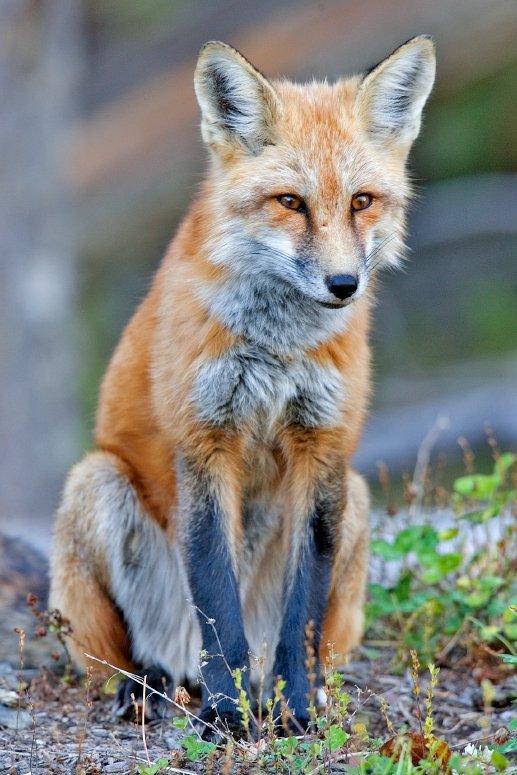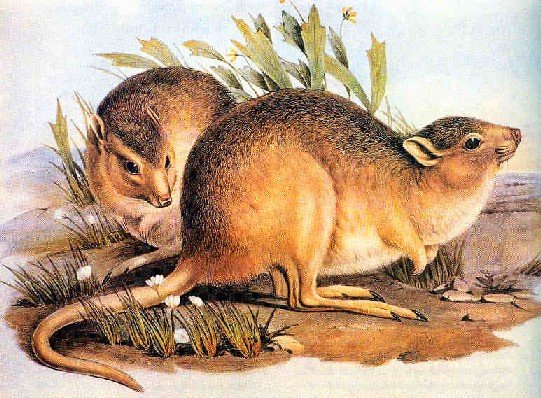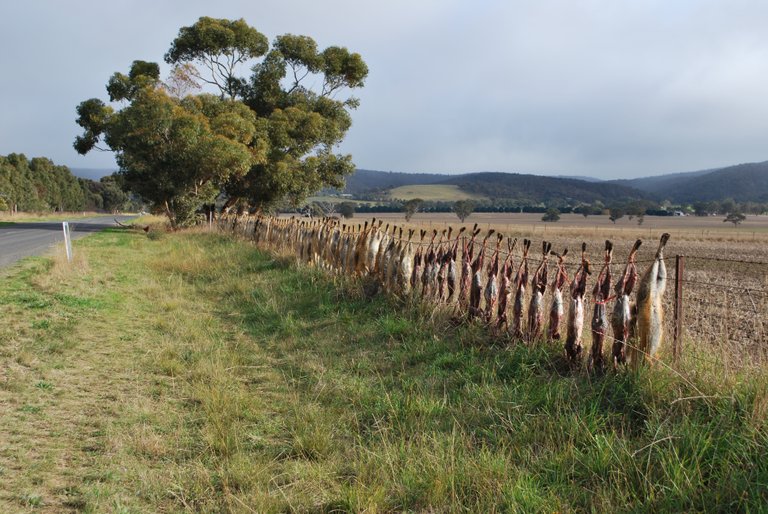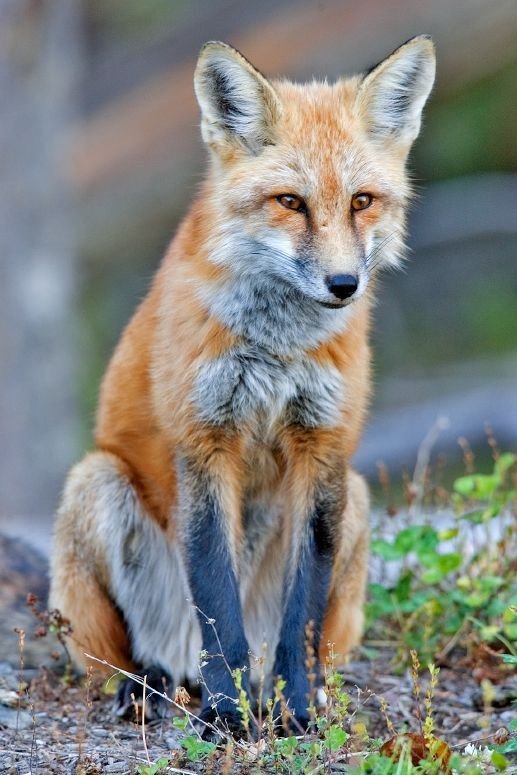Australia is a prime example of how bad things can go if we introduce new species of animals or plants to a new environment. In today’s post I want to write a bit about how the Red Fox (Vulpes vulpes) were introduced to Australia, and how much chaos it brought to the local ecosystems.

Two red foxes. Image by Keven Law, posted with the Creative Commons Attribution-Share Alike 2.0 Generic license.
How the red foxes got to Australia
The red fox was originally brought to Australia in 1871, and were released in Victoria (some sources claim earlier, as far back as the 1830s). They were intended to be used for recreational hunting, but quickly spread around the country. They spread to Queensland by 1907, and Western Australia by 1912, and have since been found on all of mainland Australia. Right now they are expected to be found in about 76 % of the continent, so they are pretty much found at all places.
The red fox naturally became an apex predator on mainland Australia, and luckily for the fox, rabbits were also introduced and spread all around Australia at the same time, so it never had a problem with getting food. The foxes were generally not as successful in areas with a lot of dingoes (Canis dingo), but they were still able to be population areas with dingoes nearby, just not as good as in areas without them.

Image by Alan D. Wilson, posted with the Creative Commons Attribution-Share Alike 3.0 Unported license.
The damages the red fox has caused to Australia
The Department of Environment and Conservation in Australia estimates that invasive predators are responsible for at least ten native species, so they are a serious threat to the local fauna. They have been directly linked to the decline and extinction of desert rat-kangaroo (Caloprymnus campestris), a small hopping marsupial found in desert regions of Central Australia. The paper I linked to pretty much shows how the population of the rat-kangaroos (Family Potoroidae) decline when the foxes enter the region is correlated, and even shows how the foxes were the major perpetrators, not drought like other people had assumed.

A desert rat-kangaroo. Image is Public Domain.
The Department of Environment and Conservation also believes that the foxes are able to predate 77 different native species, which includes 10 threatened species. They are generally able to kill prey that are up to 5 kilo in body weight, which means that they are able to kill most small and medium-sized marsupial and rodent species, as well as many different species of birds (and their eggs).
Will the foxes even predate on koalas?
Everyone loves koalas, and it seems that the foxes does as well, but they would rather eat than pet them. Until 2016 no one expected the red foxes to be able to climb trees in order to get their paws on koalas, but this behavior was documented by Valentina Mella at the University of Sydney, Australia during her koala research. She found several cases of red foxes climbing up the eucalyptus trees, and believe that they do this in order to predate on koalas! The cameras she had did not capture footage of a fox actually killing a koala, but it showed the fox with hunting behavior in a eucalyptus tree, which makes it very likely. that it was in fact in the hunt for koala meat.
No one can really know what happens when we release plants and animals into new regions
The point that I really want to make with this post is about how complex the ecosystems often are, and how even small changes can have a huge effect on many different species. The hunters who wanted to shoot some foxes did not anticipate that they would be responsible for the extinction of 10 different endemic species, or that it would have lots of different ecological consequences for over three quarters of Australia.
While Australia is a very complex example due to it not really having all that many predators, similar consequences can be seen in other parts of the world when new species are introduced. There are countless of examples of areas that have had their local ecology altered or even destroyed by invasive species, and species that have gone extinct because they were killed or outcompeted by an introduced species.
Can Australia get rid of the red fox?
It seems very unlike that Australia will ever be able to get rid of the red fox at this point, but the government seems to be trying its best to get rid of it. It is legal to hunt it in all states, and even poison it, but the eradication of the species has still proven very difficult due to the fact that they are nocturnal, breed easily and don’t always eat the poison.

Lots of dead foxes in Victoria, Australia. Image by Wikimedia user Mattinbgn, posted with the Creative Commons Attribution 3.0 Unported license.
Some scientists want to use dingoes or even reintroduce Tasmanian devils to the mainland Australia in order to reduce the fox population, which might actually work. Speaking of Tasmania, this little island south of Australia is very afraid that the foxes will get a foothold on this island, and have very strict policies in place to prevent this from happening. If you spot a fox in Tasmania you are urged to call the “Invasive Species Hotline”, which will deploy a hunting team to get rid of the fox. It sounds a bit over the top, but this seem to actually work a lot better than just incentivizing the hunters to shoot them when they are bothered.
Thanks for reading
Thanks for reading about how a few hunters were able to completely destroy several native Australian species by releasing foxes into the nature! I hope you enjoyed the post despite the grimness of it.
I love foxes lol...
If rabbits were introduced at the same time, which I know are also a huge Australian menace, why didnt the foxes just cancel out the rabbit population ? Why have rabbits (traditionally delicious fox food) prospered in spite of the foxes?
In Australia there is all manner of dangerous evil creatures ! If the rat kangeroos have gone, they must have eaten something, which I assume is now doing well ?
So many steps in the food chain, but doensnt it all balance up eventually anyway ? At the end of the day, it's one planet. We're here so we're all native.
That's a good question. I don't know the details, but I would assume that the conditions for the rabbits were very good, so they were able to spread a lot more quickly than the foxes. They also have a much shorter generation time, and can have an exponential growth because of how many offspring they can have. So I think they were simply a perfect fit for Australia, while the fox took a little longer to spread and grow in numbers.
The desert rat-kangaroo fed on plants and some insects, and you might be right. However, both these organisms probably have other factors that prevent them from becoming too abundant (I would assume water since they lived in desert regions). But yeah, it can have cascading effects on the food web for sure! Sadly I don't know much more about this specific case :(
But thanks for leaving a comment, @nathen007!
Its always the best writers that leave me thinking so much I end up with more questions than answers and then make me read further :-)
This was a great read, thanks for sharing, i'v always been interested in things of this nature. I think that if they were to introduce the rabbit it would cause a trophic cascade and potentially be detrimental to other species which rely of the same food sources as the rabbits.
You're welcome. I'm glad you liked it :)
The rabbits are already introduced to Australia; it happened about the same time as the fox.
"Some scientists want to use dingoes or even reintroduce Tasmanian devils to the mainland Australia in order to reduce the fox population, which might actually work. "
Hmm I'm sceptical. In most situations I believe the best thing to do would be to let nature figure it out. First we imbalance the ecosystem by introducing a new species, and then we are going to fix it by doing more of what ruined it to begin with? I know there is a successful examples with the wolves in Yellow Stone national park, from what I know controlled experiments like these are very limited. If you know about some other cases, I appreciate if shared the info.
As always, thank you for an interesting article!
Hi, @partywalrus!
I get why you are skeptical to this, and for the most part I also am. However, one key difference is that the red foxes never belonged to Australia in the first place, while the Tasmanian devils used to be found in certain places of the continent (and not only on Tasmania). No one knows why they went regionally extinct in Australia, but scientists believed they were on the mainland until 430 - 3,000 years ago (yeah, that's a huge spread, but the scientists cannot seem to agree on a number).
My point is that a reintroduction is generally considered much more safe than the introduction of a foreign species. The Tasmanian devil and the Tasmanian wolf/tiger (Thylacinus cynocephalus) were the apex predator in Australia along with the dingoes, so the theory is that they will be able to fill this niche again by out-competing the red foxes.
There are of course many things that can go wrong, but having Tasmanian devils back on the mainland would be a lot more "natural" than having foxes there, so the consequences are likely to be less than keeping the red fox the apex predator.
There are many examples of species that have been reintroduced after being regionally extinct (the Eurasian beaver is a good example; this was pretty much only surviving in Norway and parts of Russia), but I don't think there are many examples of reintroduced predators into a big region like this. The only other example that comes to mind is the Mexican Grey Wolf that was about to go extinct, but were captured and bred before being released back in the wild a while later.
That makes sense, but I'm still on the fence. Need to see some more actual cases, which we might see here.
More cases is always better. It will be interesting to see if Australia ever tried to reintroduce the devil back to the mainland, and if they ever do, I will surely look closely at the development.
Yeah for sure. I suppose Australia is a good place to conduct those experiments. If things go haywire, they are at least confined to the borders of the "island".
Hehe, that's true. But the thing is that the scenario you're imagining where the devils spread to most part of the island is more close to what nature was before humans intervened than what it is like now.
It's funny because I was just around an area in Australia that was having the same problem. I can't recall the name right now, but it was a tourist attraction that was focused on bees. I remember thinking that a fox infestation would be adorable, but the tour guide pretty much said that it was devastating. There was another infestation of cats in another area and that sounded as bad as the foxes.
The red fox is far from the only animal that Australia has been having problem with importing back in the days! As you mention cats are also a problem, but to be fair, so are they in most of the world (but most people don't want to acknowledge this fact because we like our furry friends). Feral dogs has also been a problem in some parts of Australia, and let's not forget the rabbits that have completely destroyed certain ecosystems by eating all the plants in the area.
Thanks for leaving a valuable comment, @thegreatlife!
Yes of course!
Also, when I went to Peru this last summer, dogs were especially bad there. I remember when we first strolled into Lima my first impression was WTF!? honestly I don't know what is worse... The fact that dogs are always fighting in the street, or the way people drive out there. lol
Oh wow, that sounds crazy! I feel like I have seen something like this in Greece as well; stray dogs just chilling out in the middle of the city or even on street corners, barking at people that came too close to them.
This reminded me a lot of the Zebra Mussel invasion of North America (I know not exactly the same thing but its been kind of a hot topic here for the past 3 decades) and I am certain people from every continent/area can bring up a specific story or whatnot. Ultimately, I really liked the post!
Yeah, as mentioned in the post, there are many examples of this from all over the world. It's a lot of the same as the zebra mussel invasion, or the asian carp invasion, but these species are even less seen by regular people, so I'm not sure if as many people care about it, which is unfortunate.
I'm glad you liked the post! And thanks for stopping by :)
No problem! Thanks for the response, the post was a very good read!
You're welcome. Have you been having much trouble with the zebra mussels in your area?
No I don't live anywhere near the affected area but I have family over there and they teach about it in the school system
Ah, alright! ;) I won't bother you by asking if you got any experience with it then.
They are cute small bastards though :) I see foxes right outside my house a couple of times a year.
Anyways, this article makes me think of the muskoxes we placed on Dovre? Do you know if they have any negative or positive impact? An article about these fascinating animals would be interesting.
That's very cool! I've only seen them in my garden once, but a few times in the forest as well. They are incredibly beautiful animals.
I actually wrote a post about the musk ox on Dovre a while back. Sadly I don't know if it has any consequences in either direction, but I would assume that it has affected the other wildlife in the region to a certain extent.
Hello friend, great story I did not know from when the red foxes existed if I have seen it in person here in my country there are enough, it is unfortunate that they were taken and released without any control and now they destroy the species is very serious, here also kill important animals of farms, I think that at world level they should control them a little so that not against the species of the ecosystem excellent post thanks for sharing it greetings success
Thank you! Foxes often tend to grow out on control in terms of population size in many places, not just Australia, so it might be a good idea to control them in some places. We do that to a certain extent here in Norway as well, where hunters get paid to kill foxes in some areas.
Foxes are my favorite animals so if Australia wants to get rid of them, they can send them to my place :P
And i think getting rid of them is not a solution since you've made a mistake by bringing them to Australia before calculating consequences.
Animals always suffer from mistakes of humanity.
I think that's because they are too smart to get close to a human :P
Well yes it's bad for koalas but that's the law of nature i think. We are trying to show our mistake as foxes' mistake.
I think we care about koalas more because they can be pets and foxes cannot. It's not a fight between foxes and koalas, it's a fight between justice and ego of humanity and ego will surely win :)
Yeah, they are really cute! I love seeing foxes in nature, but sadly they are very shy, do it does not happen all that often.
It's very unfortunate that they have to suffer because of humans, but on the other hand it's not fair for the koalas who get killed by them either..
Hi valth.. Actually natural distribution is best when someone try to introduce any change in nature it cause some serus damage.. Actually natural food chains and webs are working at their best when one predator will increase the preys will decrease.. There are alot of examples when man introduce any new species from other ecosystems and it disturb all the new ecosystem.. Nice article.. I amquite agree that littke aninals should be protected in their natural habitat
Yeah, this never really works out the way we plan to!
Thanks for stopping by and leave a comment :)
Hahhhh.. You are right the reason behind is very simple that nature always planned much better than us.. You are welcome.. glad i found a good writer of my own interest and subjects.. Keep it up
God bless you
Keep smiling..😊
I think you ll not bore to read my comments as i cant leave any comment without reply..
Thanks a bunch for making this post to introduce Red Fox that it brought to Australia in 1871 and then it spread across the countries. If RED FOX is legal to hunt then all Australian hunted them whenever they want to get rid out of it. This isn't the best solution since animals are also have right to live. I'm not much fond of animals but justice is for all..!
It's important to remember that the small species who get eaten by the foxes also have a right to live. And the red fox species as a whole does not really belong in Australia, but species such as kangaroos and koalas do, so I prefer the latter one to stay alive more than the red fox :) Thanks for the comment!
Unfortunately we are destroying the nature with our hands and facing these consequences. Rule of life is simple, if you go against the nature you will be in trouble.In an ecosystem, each organism has its role and purpose. Disturbing the balance of an ecosystem can be disastrous for all the living things relying on it. Same thing happened in Australia as you mentioned in you post.
In my 2 cent opinion it's not a smart choice to poison red fox because in this way you can easily kill other animal
Yep, this is what we get when we interrupt the natural ecosystems that have evolved over a long period of time. It's best to not interrupt these anymore than we absolutely have to. And I agree with the poison, it's far from the best solution!
But the sport hunting in the 1800s was so good! So that counts for something, right?
Hopefully, we've at least learned some lessons from things like this, though I sort of have my doubts.
Haha, I bet the sport hunting during the 19th century was amazing! Just rich people bringing unfortunate animals from the other side of the world so that they could shoot them for fun, or even have their dogs tear it to pieces.
I would also hope so, yet there are still often examples of invasive species that cause a lot of trouble, although not on such a large scale as the foxes did.
Yeah back then rich people were like, "well, we've got foxes here, but wouldnt it be way cooler to kill one in Australia!?!
(Today theyre like, "which coin should i pump and dump this week?" Lol)
A big problem in the US in recent years is the emerald ash borer. Have you heard about those?
Haha, they must be even better to kill in Australia than in Europe for sure!
I've heard about it, but I don't have much knowledge about it. But it's really unfortunate that it is causing so much damage.
Thanks for introducing a new specie.Red fox seems very dangerous in Australia.I never knew they were dangerous .Australia should do something to get rid of these fox.Are you from australia?
You're welcome. No, I'm not from Australia. I'm located in Norway, pretty much at the opposite end of the world!
They should absolutely do something about it, but it is more difficult than you can imagine to get rid of a whole continent filled with foxes.
The foxes never thought that they ended with these animals in Australia is wrong in this country should act to protect those Kanguros and ensure their existence on this planet, there are steps that can be taken to solve that problem good post friend
hey .. i know it feel so ward but what ever you post that i open its something new like seriously naver hard of any animal i saw at your post i dont know how but iits new for me
Hi, @azizulhassan. Have you never really heard of a fox before? :O
This post is nice... Am not that much of a fox person but Surprisingly I read to the very end.
Tnx @valth.
you may not be @sandyk but Foxes are my all time the favorite animal, they're the best!! I never want these adorable creatures to become extinct, even if they aren't endangered
Don't worry, foxes are not going to become extinct anytime soon! They are great at adapting to change, so they will stay around for a while ;)
I'm glad you liked the post, @sandyk :)
Every time I interact with new people i check their posts.
I like your content, so you have a new follower! :D
Thank you, @skytrex! I'm happy to hear that you enjoy my content :) I'm glad to have you as a follower.
The principles of Sustainable Development is important cos man's activities have impacted much into our environment. Interdependence and exsitu conservation counts.
Yeah, that's true, @emakwa :)
thank you @valth for sharing this valuable information with us
You are welcome ;)
Being A SteemStem Member
Thanks for the upvote, @steemstem :D
Excellent photo

Thanks, but I'm not the one who took the photo ;) See the credit for more info about it.
protecting our natural and life is our most precious duty.
Yes, I agree that it is our duty. Too bad many people don't care at all :(
los zorros son una raza fuerte y audas
I sadly don't speak Spanish, so you need to write in English if you want to get a response in my comment section, @stephen14 :)
Wao so beautiful
Yeah, they really are beautiful!
excellent article! very informative, the foxes are very cute sadness that are a threat, you have my vote, greetings from Venezuela.